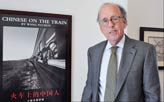Kaleidoscope
Fatherhood lowers testosterone in men
Updated: 2011-09-13 09:14
(Agencies)
* Drop may help men cooperate in care of child
* Decline is greatest right after baby arrives
CHICAGO - Fatherhood lowers testosterone levels, US researchers said they have confirmed, making it easier for men to be involved in raising children.
High levels of the hormone can rev up a man's sex drive, increase risk-taking behaviors and raise the need for social dominance. Those factors can help win a mate but are poor traits when it comes to raising a baby, which requires cooperation from both parents.
"Our study shows that human fathers are biologically wired to help with the job," said Christopher Kuzawa of Northwestern University, who worked on the study published in the Proceedings of the National Academy of Sciences.
Prior studies have shown fathers tend to have lower testosterone than men who have no children but it was not clear whether fatherhood was the cause or that men with lower testosterone were more likely to become fathers.
The Northwestern study tried to answer that question by following a group of more than 600 men from the Philippines over five years. The men were not fathers at the start of the study.
The team saw clearly that right after the men became fathers, their testosterone levels dropped, at least for a short time.
"It's not the case that men with lower testosterone are simply more likely to become fathers," Lee Gettler of Northwestern University, who worked on the study, said in a statement.
"On the contrary, the men who started with high testosterone were more likely to become fathers, but once they did, their testosterone went down substantially."
Gettler said the findings suggest fathers may experience an especially large but temporary drop in testosterone when they first bring home a newborn baby.
"Fatherhood and the demands of having a newborn baby require many emotional, psychological and physical adjustments," Gettler said. "Our study indicates that a man's biology can change substantially to help meet those demands."
Dr Allan Pacey of the University of Sheffield said testosterone levels in men generally do not change much.
"They can slowly decline as men get older and change in response to some medical conditions and treatment. But to see dramatic changes in response to family life is intriguing." he said in a statement.
Professor Ashley Grossman, a professor of endocrinology at the University of Oxford, said endocrinologists tend not to pay much attention to men's testosterone levels, as long as they are in the normal range.
"Life and biology may be much more subtle and adaptable than we had previously thought," he said.
E-paper

The snuff of dreams
Chinese collectors have discovered the value of beautiful bottles
Perils in relying on building boom
Fast forward to digital age
Bonds that tie China. UK
Specials

Let them eat cake
Cambridge University graduate develops thriving business selling cupcakes

A case is laid to rest
In 1937, a young woman'S body was found in beijing. paul french went searching for her killer

Banking on change
Leading economist says china must transform its growth model soon
